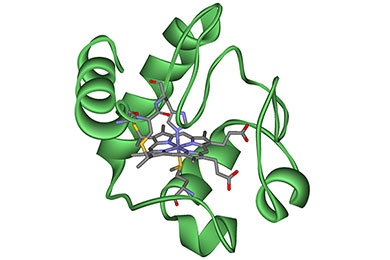The mission of the Metallotherapeutics Research Center at the University of Maryland School of Pharmacy is to bring together researchers across disciplines who have a fundamental interest in metallotherapeutics, metals in biology, and the role of metals in the environment.
We strive to improve human health and welfare by identifying new metalloprotein drug targets, developing new metal therapeutics, and improving current metal-based medications.
Watch this three-minute video for a detailed overview of the Metallotherapeutics Research Center at the University of Maryland School of Pharmacy. Learn about the importance of metalloproteins in the human body and how researchers at the center are targeting these proteins to develop new therapies.
 Metals Play a Significant Role in Our Everyday Lives
Metals Play a Significant Role in Our Everyday Lives
The sequencing of the human genome revealed that one-third of all proteins are metalloproteins that require a metal ion such as iron, copper or zinc to function. The impact of metals on human health continues to be far-reaching.
- Metalloproteins have been implicated in many major diseases affecting the U.S. population, ranging from infectious disease and inflammation to cardiovascular disease, diabetes, Alzheimer’s disease and Parkinson’s disease. However, the role of the metalloproteins in many of these diseases remains poorly understood.
- Toxic metals, such as lead and chromium, target metalloproteins, leading the neurological disorders and cancer. Lead is a leading cause of learning and behavioral disorders in children, especially in major cities such as the lead paint poisonings in Baltimore and Chicago, as well as the recent water contamination crisis in Flint, Mich. Yet, the mechanisms behind how toxic metal ions lead to disease is not clear.
- Metal-based drugs have been successful in targeting a range of diseases, such as cancer, arthritis, and anemia. Although there are several new metal-based drugs currently in the pipeline, the development of this class of drugs is limited because their mechanisms of action are poorly understood, limiting efforts to improve their safety and efficacy.
In bringing together researchers with backgrounds as far ranging as environmental chemistry, bioinorganic chemistry, biochemistry, microbiology, we aim to increase and expand our understanding of the basic biology and chemistry of metal based proteins and systems and their role in disease. By disrupting the discipline-centric approach of academic departments and centers, the Metallotherapeutics Research Center not only addresses a gap in the area of drug development and regulatory sciences, but also positions the School of Pharmacy as a nationally and internationally recognized leader in research on metals in medicine and the environment.
